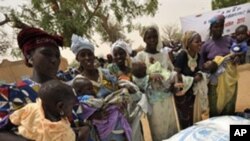A United Nations survey shows a marked deterioration in the nutritional status of children in Niger. The World Food Program and UN Children's Fund, which carried out the annual nutritional assessment, are urgently appealing to the international community for help in combating rising malnutrition rates among Niger's children.
The UN agencies find the situation of children in Niger is far worse now than it was 12 months ago when their last nutritional assessment was issued.
The survey finds nearly 17 percent of children under age five are acutely malnourished. To understand the seriousness of this, spokesman for the UN Children's Fund, Jeremy Hartley. says alarm bells go off when acute malnutrition rates reach 15 percent.
So, it is particularly alarming, he says, to realize in some places in Niger, levels of acute malnutrition have reached 22 percent.
"And, in this context, we are implementing significant preventive and curative activities for children suffering from global acute malnutrition," he said. "More than 100,000-107,000 children have been treated between January and May 2010, which is an extraordinarily high number."
Hartley says these levels of severe acute malnutrition seriously increase the risk of children dying.
"I do not have figures on that, but given that there… is severe acute malnutrition to the extent that I have explained, I would imagine that there are fatalities. Also, in countries such as Niger, there are a lot of women and children living in rural areas who would not have access to the services that we would want them to. So, we might not necessarily have all the data on that particular aspect of the tragedy then," he said.
UNICEF says it plans to launch a large-scale nationwide communication campaign in the coming weeks in an effort to stem further deterioration in the nutritional status of children.
The campaign is aimed at getting nursing mothers to breast-feed their infants exclusively for up to six months. UNICEF says this is the only protection for infants and young children against malnutrition.
Many Children in Niger Acutely Malnourished




